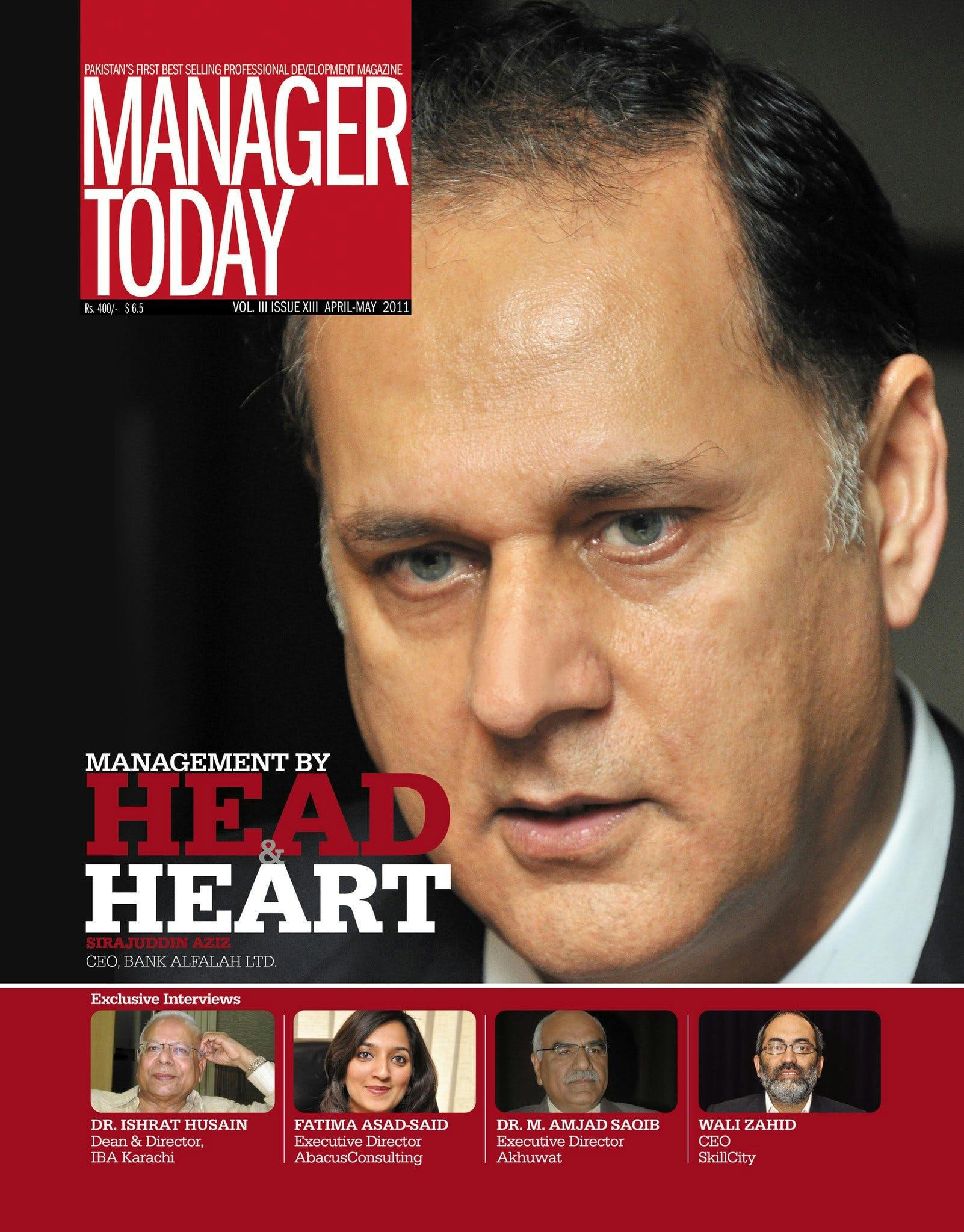Mystic Trainer: Wali’s interview with Manager Today

Manager Today: Tell us about your background, education, experience and exposure?
Wali Zahid: I am a leadership trainer, conference speaker and C-level executive coach. I’m CEO of Skill City which is a learning and coaching firm. I have been teaching and training for 20-years now.
Before that, I was a print journalist, working with Dawn, The Nation and The News. I became the youngest-ever Editor of daily The News, Lahore in 1991. With BA in Journalism and MA in Mass Communication, I went to University of Kent at Canterbury in England for an MPhil leading to PhD in International Conflict Analysis but failed to produce a thesis.
Generally, my tenures have been short at various places I worked in, except the British Council where I worked as Country Director, Management Development Services for seven years (2001-08).
I have travelled to all but one continents – both to learn and teach. My writings appear on several sites including ceorefresher.com. My iBook, Great Training in 10 Steps, is quite popular and its earlier editions have been downloaded in 1,000’s.
Q: You lead one of the longest-running Train The Trainer (TTT) workshops in Asia. What are the main challenges of learning, training and coaching in Pakistan?
There are several challenges from two perspectives:
One, the organisations are not an educated consumers. They really do not know what they are buying. To them, what is popular in market may be good for them.
Two, our training delivery has not reached a ‘world-class’ level. It has been mostly faddish. If one firm or trainer has succeeded in using lots of physical activities, every other trainer wants to follow this. If one firm has created a name for out-bound training, everyone wants to offer this.
There is also an issue of one-size-fits-all, off-the-shelf training courses, which is really a waste of client’s money.
Also, learning is equated with training. In reality, we may try hard to train people using all sorts of fancy things, but unless they have learnt something useful and usable, learning has not happened.
As far as coaching is concerned, it has yet to pick up. Many of our senior executives do not feel they are or need to be coachable.
Q: Where do you see training as a profession in Pakistan in the next five years?
It will change, but I do not see the five-year horizon any different from today except that there will be a lot of new players. For some, it might be a bigger piece of cake while a few others will disappear because of the market forces.
Q: What is your ‘take’ on training as investment? Why is it still called an expense?
It’s a no-brainer! Training is definitely an investment. However, spent poorly on the unmotivated employees through the amateurish training providers could be a waste of everyone’s investment and energy. So the CFO’s cry may have some weight!
Q: Anyone who can speak and carry a laptop becomes a trainer. What are some of the core competencies required to become a qualified trainer?
To be frank, there’s nothing we can do about what you call ‘laptop trainers’ as there isn’t any entry barrier of qualification. This is a breed, which will always be there.
It’s only the market forces which will determine who stays or goes.
To become a qualified trainer, there are at least four competencies:
- Sufficient knowledge of your subject area. Why only sufficient? Because in the google era when at least one million new books are being published every year, a trainer cannot aim to gain every bit of knowledge.
- Ability to present actionable information in bites, in easy-to-comprehend and credible manner.
- Ability to manage individuals and groups, particularly when they may become disruptive.
- Ability to give feedback to learners on how they are doing in their class work/assignments.
Q: How can we measure training effectiveness?
By knowing if the people have started getting better at what they are doing. Their businesses will improve with profits by giving customers better experiences?
Q: How do you view Return on Training Investment (ROTI)?
ROTI is a notion I abhor. It has become an industry fad! There are many scientific methods to calculate ROTI, which you can use to dazzle your CEO. But I would rather utilise my energies in getting common-sense training for my staff than using numbers to show off.
On a global level, in spite of all these illusory ROTI attempts, ASTD (now ATD) data says that billions of training dollar go to waste every year!
Q: Globally, andragogy is in and pedagogy is out. Why in Pakistan, we still have lecture method in vogue as the main vehicle for training?
I doubt if anyone uses lecture method in corporate training settings any more. In fact, andragogy has gone too far: in every workshop, I see high-energy, physical activities, balloon-bursting competitions and trainer running up and down. Not a good news!
Q: That was my next question: What is your ‘take’ on so-called high–energy, activity-based training in fashion here?
I have serious reservations about this type of training. When I visit CIPD HRD conferences in London, I often bump into firms that specialise in training through physical activities. There are clients that do use their services occasionally, but most of the learning interventions are still classroom training with a mix of cognitive activities and some light energisers.
Because, in order to acquire new work behaviour you need to accept new learning at a cognitive, rational level.
These physical activities may touch you at an emotional level and, just like a drug, may give you a temporary ‘high’ but when the hangover is over, you tend to forget what it was all about!
That is why in Pakistan we do not see any world-class behaviours in our managers and leaders.
Q: How today’s training needs analysis is different from what it was 10 years ago?
There has been a fundamental change. ‘T’ has been replaced by ‘L’ (i.e. learning). In fact, this year CIPD used the term LTNA (Learning and Training Needs Analysis). The other change has come from the traditional ‘gap’ analysis – Gallup has found that training does not engage people at work because people are sent to training in their weak or gap areas which they resent.
By combining data from Gallup Engagement Index with Gallup’s strength-based leadership, my feeling is that future of LNA lies not in the gap analysis but identifying individual’s workplace strength and developing it further.
It’s a kind of saying: I’ll ignore your weakness (unless of course that’s mission-critical) and concentrate on your strength!
Q: What are the impediments which hamper transfer of learning to workplace?
It could be organisation’s vicious circle itself! You send away an employee on training and when he or she returns to workplace and shares what he/she learnt new, you would say: that was classroom, you are now in real life; get back to work! Employee repatriation at workplace is a real issue. Managers and organisations need to plan this before people are sent off.
Q: Considering that you are the only in-country resource offering Leadership for CEOs workshops, what are the key issues in C-level training here?
Several. One, sadly there is a large number of CEOs who do not feel the need to be coached. The success that they have already attained means they are doing things right.
But to be fair to them, not many quality training or coaching programmes are available in country from which they can benefit. So, both sides are at fault – the C-level learner and C-level providers. Adding to that, there are CEOs who do learn but are unable to perform that learning, a kind of knowing-doing gap!
Q: Being a leadership trainer and coach, can you define leadership in one sentence?
‘Leadership is helping people achieve their objectives (and [in that process] yours)’.
Q: What entrepreneurs need to do different?
Our entrepreneurs need to think big, see beyond horizons, collaborate and act global.
Q: You run ‘Women in Leadership’ training courses. What are the key issues facing women managers in Pakistan?
Many.
Besides obvious crimes against them like sexual harassment and being treated as an object, there is a fundamental issue of glass ceiling/glass cliff (although I would insist that it’s in the mind rather than in reality).
The other two issues are work-family balance and pay gap.
From inside out, emotional intelligence could be a major differential – women might need to work on how they manage their emotions particularly in the face of confrontational situations at work.
Q: How can we overcome political leadership crisis in Pakistan?
In the face of myriad complex problems, it may sound foolish to be optimistic, but it’s not really rocket science.
For over a decade and half, “I have been working on something called ‘the difference between the decayed behaviours and developed behaviours.” I think we just need to replace one set of behaviour with the other – one bit at a time.
I often say it light-heartedly, “If I were the President with some meaningful mandate, it would have not been hard to turn around this country in five years.”.
Q: What is so different about your writings?
Because I have been trained as an editor, economy of words is very dear to me. You will find me brief in my writings. People like them for their practicality and insightfulness. I aim to touch areas which have been either ignored or under-emphasised by Western thinkers.
For example: Like my central area of interest is leadership readiness. Too little has been written on that. What I aim to prove in this research is that opportunity travels to a ready leader as opposed to a leader looking for opportunity.
Besides areas like value-based trainer (VBT), Wali’s Will-Skill Matrix, Wali’s four T’s for leaders, I am also working on the Prophet Muhammad (SAW)’s life lessons for CEOs and the Prophet (SAW) as an educator/trainer.
Currently, I am interviewing CEOs of large businesses in Pakistan on several research projects (Into the C-Suite now available here).
Q: With your busy schedule and travel, how do you manage work-life balance?
In my previous job, I used to have a hectic itinerary with 130/150 days a year on plane. Since I started my own firm, I take it easy. There’s not an awful lot of work. I am not much of a socialiser either and do not appear at events in which I have no role. So after work, it’s only family and kids.
Q: You teach at premier business schools. Are you satisfied with the quality of MBA graduates?
Yes, because they have outsmarted our generation in many ways: they are very articulate, smart, ambitious, peer-driven, achievement-oriented, because of Western influences, while they study or work, the aspect of socialising overtakes their primary goal of studying or work.
They would often ignore an assignment or a customer over their instant need for gratification. In some cases, I see indications of moral bankruptcy.
Q: What core competencies do you want to see in the upcoming managers?
Better work ethics (although in a society like Pakistan, you cannot ask for much!), global aspirations, fear of God (it may sound funny, but perhaps this may take care of many issues ailing our workplaces).
Q: Your dream role for yourself?
Something to do with serving the country. Our country today is in a big mess. No one including myself can do any repair attempt with such chaos around.
However, if we were in better times when at least basic law and order was in place, perhaps, I would take up a job of a minister for skill development and channelize the creativity, ambition and energy of millions of Pakistanis.
The world would be surprised by Pakistanis’ talent and skills!
Q: How do you define success?
Success is relative and personal. To me, happiness with sufficient levels of affluence and a healthy life spent in surrendering your desires and aspirations to Allah’s will and His pleasure is good enough.
Wali Zahid: Trainer Profile
Wali is an international consultant, speaker, leadership trainer and executive coach. He is CEO of Skill City [Asian answers. To Asian questions], a new-generation learning and development firm with a developing-country perspective.
He has spoken to audiences in South Asia, Southeast Asia, Middle East, East Africa, Western Europe, England and the United States.
Wali has trained thousands of managers and business leaders in the past 25 years from most Fortune-500 companies. His leadership and train the trainers workshops have been crowd pullers. His branded workshops include ‘Leadership for CEOs’, ‘Women in Leadership’, ‘Leadership Readiness’, ‘Leadership Derailments’ and ‘Train The Trainer’.
A lifelong learner, Wali has received training and education in the USA, Canada, UK, Germany, Austria and Singapore. He is an accredited leadership trainer from Team Management Systems, Australia. He has also taught pioneering courses at MBA level in Pakistan’s premier business schools like IBA Karachi, CBM and Szabist.
Wali’s most recent employer has been British Council, Pakistan where he worked as Country Director of its Management Development Services during 2001-2008.
He has been member of UK’s Institute of Directors, Chartered Management Institute, Chartered Institute of Personnel & Development and American Management Association.

Wali Zahid
Wali Zahid is a longtime China watcher and a Pakistan futurist. An award-winning journalist, he writes on issues of significance to Pakistan and CPEC & BRI.
Related posts


